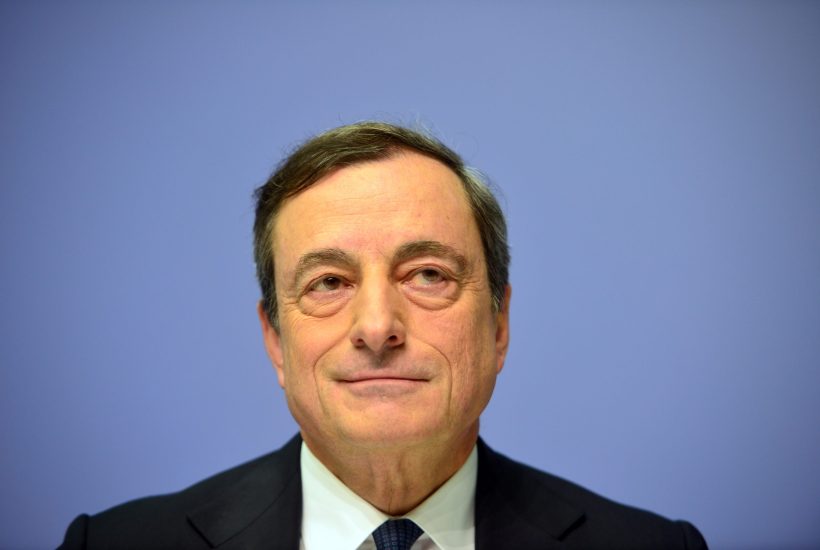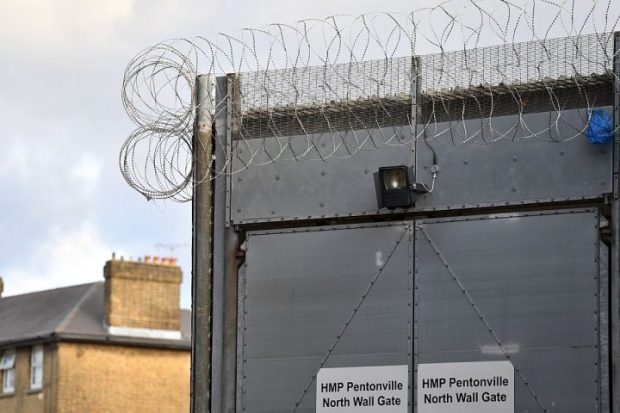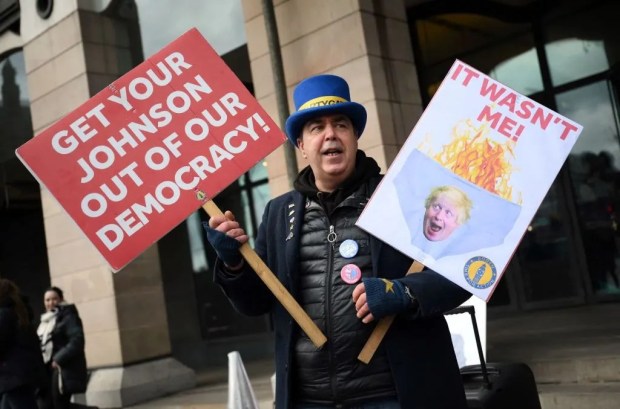The world these days is so blasè about the destruction of democracy that no one even thinks it worthy of comment that an important free country such as Italy has not had an elected prime minister since the last one, Silvio Berlusconi, was forced to resign in 2011 during the Eurozone crisis after a palace coup orchestrated by Brussels, Berlin and Paris.
That is ten years without a prime minister chosen by the Italian people at the ballot box in a general election. The electoral system, currently a hybrid of first past the post and proportional representation, is partly to blame. But the real reason is the Italians. They seem anthropologically incapable of giving enough votes to form a government, even to a coalition of parties — let alone one single party.
Since the fall of fascism, the abolition of the monarchy and the foundation of the republic in 1946, Italy has had 67 governments. These include the seven governments since the demise of Berlusconi, which have been presided over by six prime ministers — most of them not even elected MPs.
And they now include Mario Draghi, much praised president of the European Central Bank between 2011 and 2019, whose new government of national unity last week won confidence votes in the senate and chamber of deputies by huge majorities.
Invariably, in interviews with the press down the years, Draghi has denied that he even wants to be a politician. Yet here he is, appointed Prime Minister of Italy by its head of state — President Sergio Matterella — in the midst of the coronavirus pandemic and the country’s worst economic crisis since the second world war.
And here’s the thing: according to opinion polls, more than 60 per cent of Italians are happy that this un-elected ex central banker is their Prime Minister. It is as if the Italians have given up on democracy.
Certainly, many Italians feel contempt, if not for democracy then definitely for their elected politicians who earn so much even without the corruption for which they are so famous. And it is difficult to disagree with them. The average gross annual salary of a doctor in Italy is €75,500 (€3,400 net a month) and of a shop worker €19,100 (€1,100 a month) but here is what a parliamentarian gets: €126,000 per annum gross salary (€5,347 a month); plus €42,000 annual allowance for board and lodging in Rome; plus €44,280 annual allowance for expenses — only half requiring receipts; and plus all sorts of other stuff such as free trains and flights.
You can maintain a tribe living the life of Riley on that kind of dosh — probably a small town in the poverty-stricken south. But Italian politicians are of course Italian people, so it is not very convincing when Italian voters pretend to be as white as the driven snow and treat their politicians as if they were a vile separate breed.
Nevertheless, they do. An indication of this is last September’s referendum which proposed a dramatic cut in the number of deputies from 630 to 400, and senators from 315 to 200. A convincing 69.9 per cent of Italians who cast their vote, voted in favour. The changes will come in at the next general election in May 2023.
The referendum was a key policy commitment of the alt-left Five Star Movement which won the most votes — 33 per cent — at the last general election in March 2018. Five Star was the major partner in the two failed coalition governments prior to this new Draghi national unity government — whose prime minister was another un-elected, non-politician: law professor Giuseppe Conte.
In its wildest dreams, it would abolish parliament and replace it with direct democracy on the internet. This drastic reduction in the number of parliamentarians is a first step in that direction, and does attack waste and greed. But it is also an attack not just on politicians, but on democracy — of the parliamentary kind.
The participation of Five Star in the Draghi government has caused a schism within its ranks. After all, not so long ago its founder, the comedian Beppe Grillo — Italy’s version of Billy Connolly — would deliver entire shows in which he ranted on about how we are in the hands of criminal organisations called banks.
Yet here is Five Star with four ministers in a government led by one of the biggest bankers of them all — Draghi — in which participates a party, Forza Italia, led by an even bigger Five Star hate figure — Berlusconi, the media tycoon — nicknamed by Grillo the psico-nano(psycho-dwarf).
But Five Star had already abandoned many of its founding principles long ago and is these days a busted flush, languishing on 15 per cent in the polls.
Despite finding it difficult to even speak to each other without hurling insults, Matteo Salvini’s right-wing populist Lega party, the second-largest in parliament, and its arch enemy and close rival the post-communist Partito Democratico have both agreed to take part in the Draghi government — each with three ministers.
So too have all other parties except the post-fascist Fratelli d’Italia which is third in the polls.
Fratelli d’Italia, unlike its two partners in the coalition of the right — the Lega and Forza Italia — wants immediate elections, which if the polls are correct would see the coalition win with more than 50 per cent of the vote. But there could have only been such elections if Draghi had failed to form a government — and he probably could have formed one even without their support. So Lega leader Salvini and Forza Italia leader Berlusconi reasoned that it was better to be in government than opposition.
His speech to the senate was 73-year-old Draghi’s first since his appointment. It revealed nothing of substance about his plans but made one thing dead clear: to give confidence to his government means giving confidence to ‘the irreversibility of the choice of the Euro’ and ‘the prospect of an ever more integrated European Union’. It seemed like a rebuke to Salvini who has been a loud euro-sceptic and only the other day, when asked about whether the euro was irreversible, retorted: ‘The only thing that is irreversible is death.’
It is not, however, difficult to predict what Draghi will try to do as Prime Minister. Regardless of Italy’s swingeing public debt, he will borrow whatever it takes, if he can, to protect and stimulate the Italian economy, just as he did at the ECB to save the euro. He has appointed another non-elected central banker, Daniele Franco, the director general of the Bank of Italy, as his finance minister. He will also try to make huge public borrowing an EU wide programme.
A year ago, Italy’s public debt was already 135 per cent of GDP, which was the third-highest in the world when measured as a percentage of GDP after Japan and Greece. Now, as a result of the pandemic, it has shot up to 160 per cent. This compares with a public debt of 68 per cent of GDP in Germany and 110 per cent in Britain (up from 60 per cent and 86 per cent respectively on the pre-pandemic situation).
Naturally, such a massive borrowing programme as the one Draghi wants cannot be undertaken without the agreement of the EU — and is completely against current Eurozone rules. It will be opposed by the Germans and the Dutch but cheered by the Club Med countries. But as the EU desperately tries to find an effective response to the twin economic and health crisis, Draghi’s desire to take on even more debt in Italy — and in all Eurozone countries as would have to be the case — could end up as a cause celebre. It will be interesting to watch how French President Macron reacts.
Orphaned at the age of 15 with his younger brother and sister when their parents died within a few months of each other, the three children went to live with a sister of his father who had been a banker. Draghi, a devout Catholic, attended a Jesuit college in Rome, the Istituto Massimiliano Massimo, and then Rome’s Sapienza University where he read economics followed by Massachusetts Institute of Technology where he did his doctorate. He worked as an economics professor, an economist at the World Bank, for Goldman Sachs and at the Italian treasury, where he oversaw a number of major privatisations before being appointed governor of the Bank of Italy in 2005, where he remained until 2011. That year, then-prime minister Berlusconi nominated him for the European Central Bank’s top job, which he got with the backing of both the Economist and the Financial Times. His arrival at the ECB coincided with Berlusconi’s resignation as prime minister and the Eurozone sovereign debt crisis.
He was nicknamed ‘Super Mario’ after he told the world in July 2012 that he was prepared to do ‘whatever it takes’ to save the euro. This meant, among other things, a vast, unprecedented programme of quantitative easing to buy vulnerable Eurozone government bonds despite persistent opposition from Germany. But while at the ECB he was also responsible for the brutal austerity regime imposed, above all, on Greece in return for bail-outs.
There can be no doubt that he is as committed to a United States of Europe as anyone. In an interview with the FTjust before his departure from the ECB in December 2019, he said that his dream was fiscal unity in the Eurozone and, like President Macron, he supports a Eurozone budget. ‘There are no lasting monetary unions without fiscal risk sharing,’ he conceded, adding that fiscal union is ‘an existential part of the euro area that needs to be completed’. ‘Presently, even a roadmap may be too much, but a long-term political commitment is essential,’ he explained.
Two of the components of his government — the Lega and Five Star, who have both been vociferously Eurosceptic — would hardly agree.
But what all the coalition members would agree, given the emergency confronting Italy, is that the only truly effective weapon in the Italian government’s armoury — at least in the short term, apart from the promised €200 billion destined for Italy from the EU’s recovery fund — is a huge increase in Italy’s already stratospheric public debt.
Less than a year ago, in the middle of the first wave of the pandemic, Draghi set out in remarkable detail in a signed article in the FT on 25 March 2020 how huge, in his view, levels of public debt and private debt write-offs would now become as a result of Covid-19 the norm across the globe when he wrote:
Much higher public debt levels will become a permanent feature of our economies and will be accompanied by private debt cancellation… The priority must not only be providing basic income for those who lose their jobs. We must protect people from losing their jobs in the first place. But protecting employment and productive capacity at a time of dramatic income loss requires immediate liquidity support. This is essential for all businesses to cover their operating expenses during the crisis, be they large corporations or even more so small and medium-sized enterprises and self-employed entrepreneurs. The only effective way to reach immediately into every crack of the economy is to fully mobilise their entire financial systems: bond markets, mostly for large corporates, banking systems and in some countries even the postal system for everybody else. And it has to be done immediately, avoiding bureaucratic delays.
Such borrowing would allow something else Draghi is very keen on: significant tax cuts.
It is impossible to see how else he can stimulate growth in an economy that has grown only 9 per cent since the Euro was founded in 1999 — compared to 35 per cent in France, 32 per cent in Germany and 45 per cent in Britain.
That there has been more or less permanent economic stagnation and often slump in Italy since the arrival of the euro — and that no Italian government has been able to do anything much to stimulate economic growth — is perhaps the major cause for the growth of disenchantment with democracy and of the rise of Euroscepticism in Italy. But the very same euro that has caused Italian democracy to be so impotent has also forced all but the most fervent sovranistito shy away from Italian secession from the EU. To leave the EU, as Britain did, is hard enough; to leave the Eurozone, as Italy would have to, is hard to even contemplate.
When not at work, Draghi leads a very low key life with his wife Serena Cappello, of Tuscan noble descent, who he married in 1973. The couple have two children, a son who is a banker and a daughter who is a biotech entrepreneur. Italy’s new Prime Minister regards home as his country house in Città della Pieve, a small town in the Umbrian Apennines, where he keeps his pride and joy — a five-year-old Hungarian Vizsla — an extremely elegant medium-sized hunting dog whose speciality is waterfowl and whose energy and loyalty are unquenchable. They go jogging together.
For now, Super Mario the euro-appassionato, in tandem with the EU, must set out to prove that Italy in the Eurozone can recover and thrive. It is a superhuman challenge and would be a colossal achievement — and it would cause even less democracy in Italy.
Got something to add? Join the discussion and comment below.
Get 10 issues for just $10
Subscribe to The Spectator Australia today for the next 10 magazine issues, plus full online access, for just $10.




















Comments
Don't miss out
Join the conversation with other Spectator Australia readers. Subscribe to leave a comment.
SUBSCRIBEAlready a subscriber? Log in